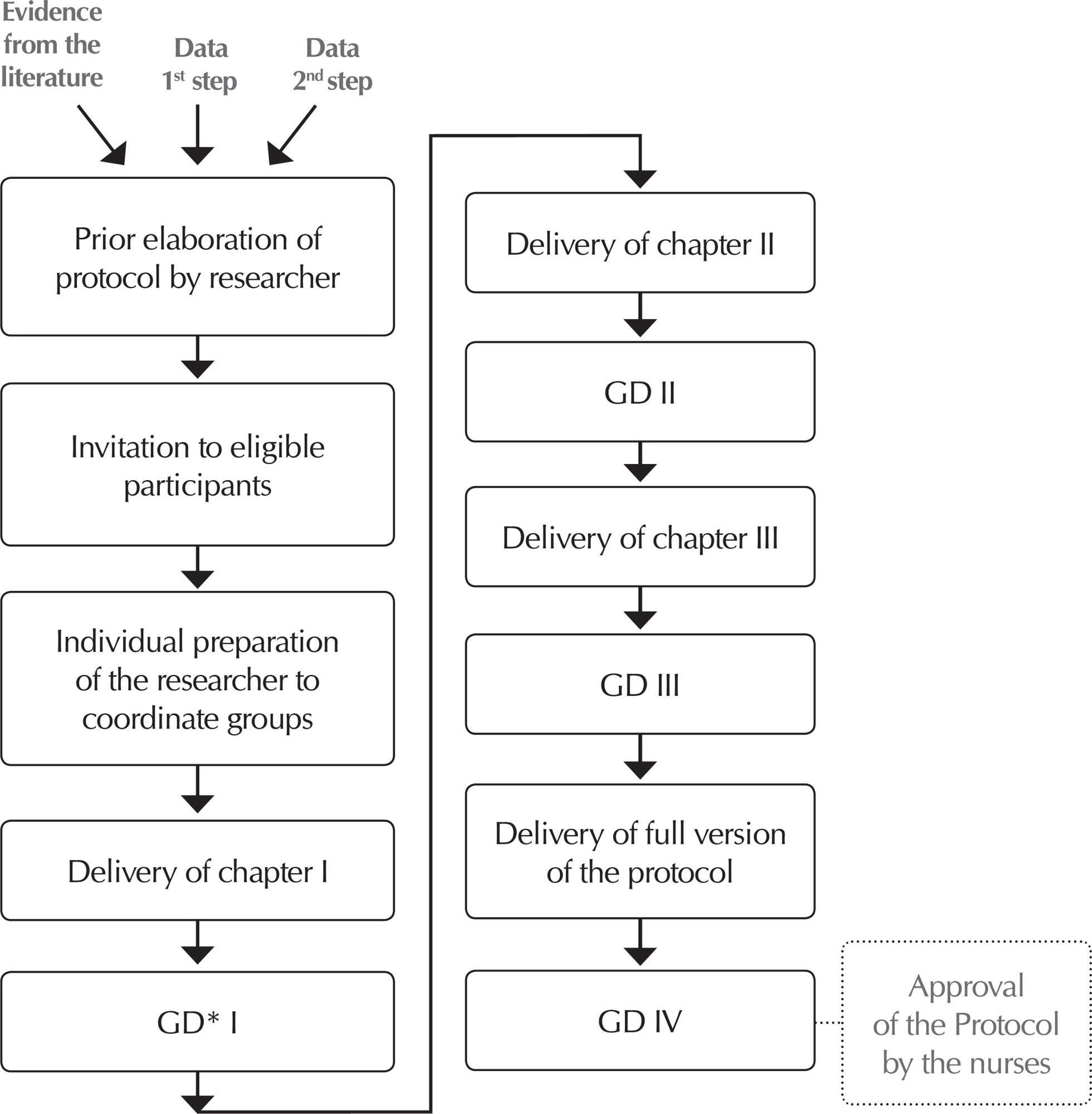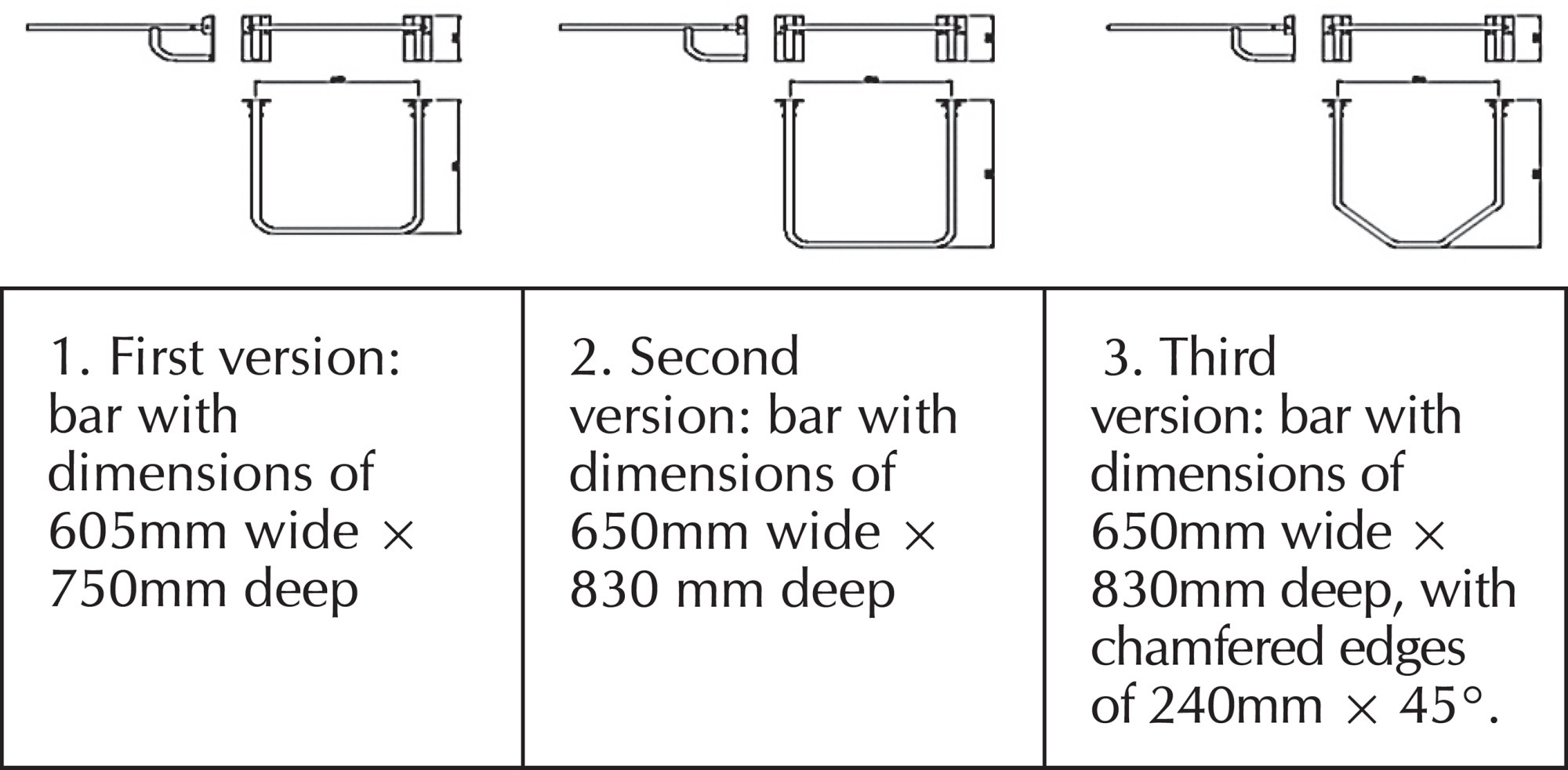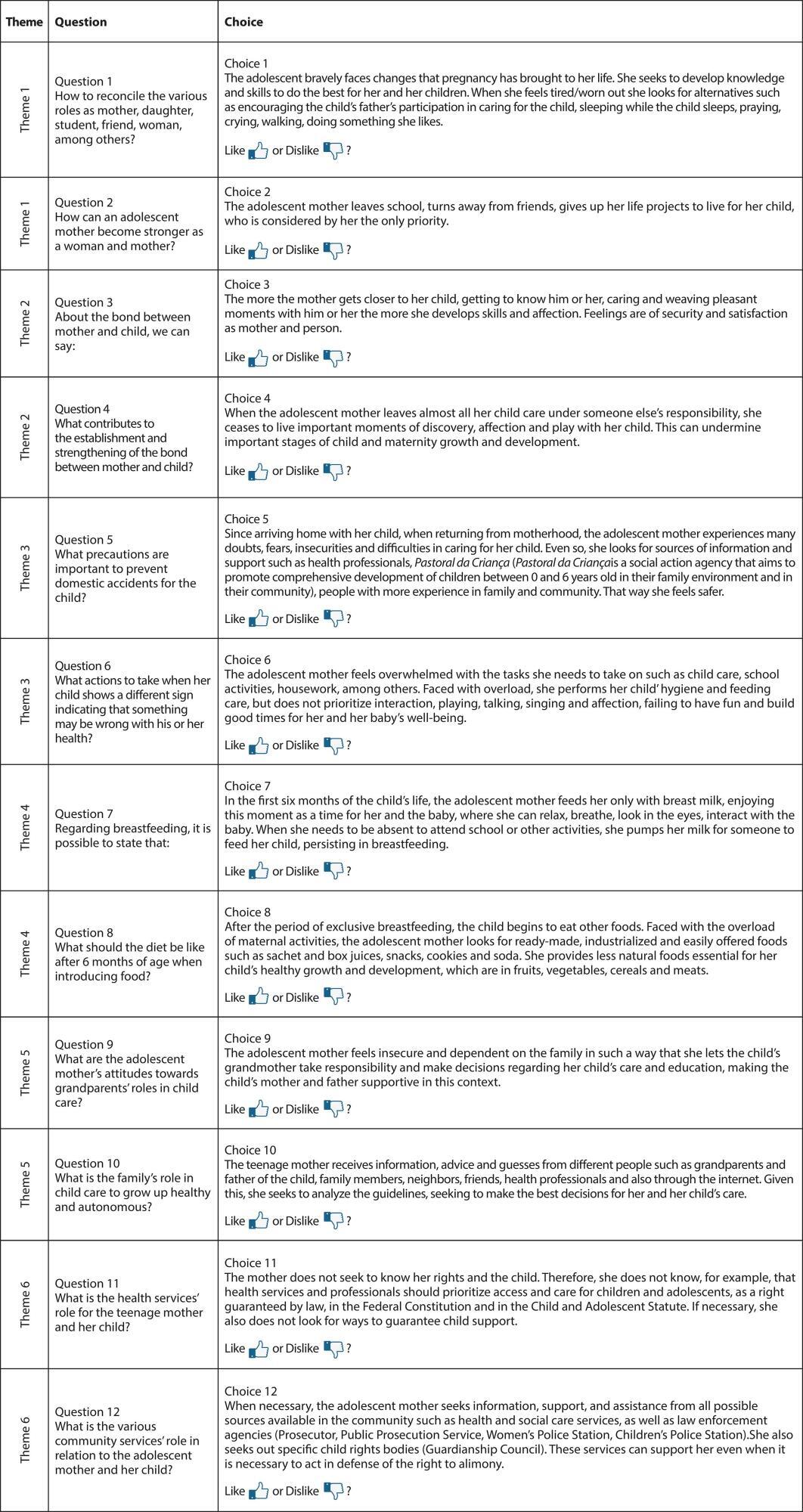-
RESEARCH01-01-2018
Deontological aspects of the nursing profession: understanding the code of ethics
Revista Brasileira de Enfermagem. 2018;71(1):3-10
Abstract
RESEARCHDeontological aspects of the nursing profession: understanding the code of ethics
Revista Brasileira de Enfermagem. 2018;71(1):3-10
DOI 10.1590/0034-7167-2016-0565
Views0See moreABSTRACT
Objective:
to investigate nursing professionals’ understanding concerning the Code of Ethics; to assess the relevance of the Code of Ethics of the nursing profession and its use in practice; to identify how problem-solving is performed when facing ethical dilemmas in professional practice.
Method:
exploratory descriptive study, conducted with 34 (thirty-four) nursing professionals from a teaching hospital in João Pessoa, PB – Brazil.
Results:
four thematic categories emerged: conception of professional ethics in nursing practice; interpretations of ethics in the practice of care; use of the Code of Ethics in the professional practice; strategies for solving ethical issues in the professional practice.
Final considerations:
some of the nursing professionals comprehend the meaning coherently; others have a limited comprehension, based on jargon. Therefore, a deeper understanding of the text contained in this code is necessary so that it can be applied into practice, aiming to provide a quality care that is, above all, ethical and legal.
-
01-01-2018
It is not a crisis itself, if does not promote changes
Revista Brasileira de Enfermagem. 2018;71(1):1-2
Abstract
It is not a crisis itself, if does not promote changes
Revista Brasileira de Enfermagem. 2018;71(1):1-2
DOI 10.1590/0034-7167.2018710101
Views1ECONOMIC CRISISBrazil has been going through crisis in the past three years, due to often and systemic cuts in funds in multiple fields of society, such as education, health, science and technology, affecting directly on Brazilian scientific production. The nursing scientific production – as being an integrative part – now experiences a phase of quantitative […]See more -
01-01-2018
Uma crise que não gera mudanças não é uma crise em sua essência
Revista Brasileira de Enfermagem. 2018;71(1):1-2
Abstract
Uma crise que não gera mudanças não é uma crise em sua essência
Revista Brasileira de Enfermagem. 2018;71(1):1-2
DOI 10.1590/0034-7167.2018710101
Views0A CRISE ECONÔMICAAs dificuldades político-econômicas que o Brasil atravessa nos últimos três anos, com cortes frequentes e sistemáticos de recursos nas mais diversas áreas, incluindo educação, saúde, ciência e tecnologia, repercutem diretamente na produção científica brasileira. Como parte integrante desse sistema, a produção científica da enfermagem passa a experimentar uma fase de declínio quantitativo na […]See more -
REFLECTION01-01-2018
Nursing and light technologies for a peace culture within the family
Revista Brasileira de Enfermagem. 2018;71:2854-2857
Abstract
REFLECTIONNursing and light technologies for a peace culture within the family
Revista Brasileira de Enfermagem. 2018;71:2854-2857
DOI 10.1590/0034-7167-2017-0756
Views0See moreABSTRACT
Objective:
To reflect on technologies for the peace culture that can be used in family nursing.
Method:
Theoretical essay, based on the premises of non-violence and peace culture.
Results:
Four light technologies are singled out for the peace culture within families: nonviolent communication, qualified listening, conflict mediation, and restorative circles.
Conclusion:
The technologies proposed can be used by nurses to promote care and policies aiming at a peace culture and non-violence in families, with the objective of assisting in the obtainment of the well-being for family systems and their correlations.
-
REFLECTION01-01-2018
The face-to-face encounter in indigenous health care: a perspective in Lévinas
Revista Brasileira de Enfermagem. 2018;71:2848-2853
Abstract
REFLECTIONThe face-to-face encounter in indigenous health care: a perspective in Lévinas
Revista Brasileira de Enfermagem. 2018;71:2848-2853
DOI 10.1590/0034-7167-2017-0389
Views0See moreABSTRACT
Objective:
To reflect on the sensitive behaviors of indigenous healthcare professionals based on the philosophy of Emmanuel Lévinas, to ratify completeness, equity, and humanity.
Method:
reflective study.
Reflection:
Studies have identified inadequacies in meeting the indigenous singularities. In the hospital and outpatient settings, they are diluted in the search for care. The difficulty of the professionals to admit them generates conflicts and non-adherence of indigenous individuals to treatments that disregard their care practices. In Lévinas, consciousness requires, “a priori,” sensitivity to access the Infinity on the Face of the Other, which in the face-to-face encounters is presented to the Self as radical Alterity, proposing an Ethical relationship through transcendence. The freedom of the Self as to the Other is finite, as the Self cannot possess the Other, and infinite for its responsibility for the Other.
Final considerations:
The Self builds essence and existence in responsibility. In the Ethics of Alterity, in Lévinas, reflections are proposed that influence sensitive behaviors.
-
EXPERIENCE REPORT01-01-2018
Implementation of the Street Outreach Office in the perspective of health care
Revista Brasileira de Enfermagem. 2018;71:2843-2847
Abstract
EXPERIENCE REPORTImplementation of the Street Outreach Office in the perspective of health care
Revista Brasileira de Enfermagem. 2018;71:2843-2847
DOI 10.1590/0034-7167-2017-0616
Views0See moreABSTRACT
Objective:
To report the experience of implementation of a clinical equipment of health care production to homeless people, denominated Street Outreach Office.
Method:
Experience report in the city of Rio de Janeiro, Brazil.
Results:
The Street Outreach Office implementation resulted from a demand for health care practices for homeless people. This implementation had intersectoral articulations, causing health professionals to carry out street care practices, which led them to strive for public policies, to rethink their actions in order to increase the resolution of care to this population.
Conclusion:
We should emphasize the importance of health professionals to reinvent their practices, daily, seeking partnerships and acquisition of new knowledge in order to achieve results that can reduce the demands of these individuals throughout their life routes.
-
EXPERIENCE REPORT01-01-2018
Developing a nursing healthcare protocol: a case report
Revista Brasileira de Enfermagem. 2018;71:2837-2842
Abstract
EXPERIENCE REPORTDeveloping a nursing healthcare protocol: a case report
Revista Brasileira de Enfermagem. 2018;71:2837-2842
DOI 10.1590/0034-7167-2017-0846
Views0See moreABSTRACT
Objective:
to report the use experience of convergent healthcare research for developing a nursing care protocol.
Method:
convergent care research developed in university hospital, from July to December 2016, with 27 participants.
Results:
the stages of the research and its results are described in the steps: conception, instrumentation, screening and analysis. The end result was the nursing care protocol in day zero of hematopoietic stem cell transplantation.
Conclusion:
convergent care research was an appropriate method for developing the care protocol, and an important contribution to the approximation between theory and practice. The nursing care protocol was the result of this study and confirmed both the purpose of the research as a professional Master’s in acquiring knowledge aimed at improving professional practice.

-
EXPERIENCE REPORT01-01-2018
Safe Embrace: technological innovation for elderly safety in the use of toilets
Revista Brasileira de Enfermagem. 2018;71:2833-2836
Abstract
EXPERIENCE REPORTSafe Embrace: technological innovation for elderly safety in the use of toilets
Revista Brasileira de Enfermagem. 2018;71:2833-2836
DOI 10.1590/0034-7167-2017-0751
Views0See moreABSTRACT
Objective:
to describe the development of a device to prevent falling for seniors when using the toilet.
Method:
we sought in literature and in the hospital market for a device to prevent falling, without success. Geriatric nurses, in partnership with the hospital engineering team, elaborated a prototype and, after several analysis, looked for a partner for its production.
Results:
the device, named “Safe Embrace”, installed and tested in an apartment of the Geriatric ward, was positively evaluated by the health team, patients and caregivers.
Conclusion:
for the benefit obtained and considering the safety and privacy during use, Safe Embrace was patented so that other institutions could use it.

-
ERRATUM04-22-2020
ERRATUM
Revista Brasileira de Enfermagem. 2020;73(3):202073n3e05
Abstract
ERRATUMERRATUM
Revista Brasileira de Enfermagem. 2020;73(3):202073n3e05
DOI 10.1590/0034-7167.202073n3e05
Views0Article “Concept formation of ambience for labor and normal institutionalized delivery”, with number of DOI: , published in the journal Revista Brasileira de Enfermagem, 72(Suppl 3):348-59, on page 357:Include after Final Considerations the information:[…]See more -
ORIGINAL ARTICLE04-09-2020
Health promotion in schools: speeches, representations, and approaches
Revista Brasileira de Enfermagem. 2020;73(3):e20180774
Abstract
ORIGINAL ARTICLEHealth promotion in schools: speeches, representations, and approaches
Revista Brasileira de Enfermagem. 2020;73(3):e20180774
DOI 10.1590/0034-7167-2018-0774
Views0See moreABSTRACT
Objectives:
to analyze speeches, representations, and approaches on health and health promotion in schools, materialized in the speech of teachers.
Methods:
a qualitative study, of the case study type, carried out with 17 teachers from the municipal and state educational network. The data were obtained from interviews and analyzed by the Content-Oriented Discourse Analysis.
Results:
medical-sanitary and clinical-biological discourses predominated. Health is represented as the absence of disease, reflecting approaches that prioritize healthy habits and changes in behavior. Problematization of social determinants occurs in projects, in an intersectorial partnership.
Final Considerations:
carrying out projects of health promotion in schools ignores the solidification of partnerships and the construction of new speeches that represent it as quality of life conditioned by social, economic, and cultural factors as well as strategies for the ideological repositioning of those actors who act in this setting.
-
ORIGINAL ARTICLE04-09-2020
Nursing work and competence in hemotherapy services: an ergological approach
Revista Brasileira de Enfermagem. 2020;73(3):e20180775
Abstract
ORIGINAL ARTICLENursing work and competence in hemotherapy services: an ergological approach
Revista Brasileira de Enfermagem. 2020;73(3):e20180775
DOI 10.1590/0034-7167-2018-0775
Views0See moreABSTRACT
Objetives:
to analyze the ingredients of the competence that the nurses use in the performance of their work in hemotherapy.
Methods:
qualitative study with 22 nurses, accomplished through documentary study, observation and semi-structured interview, with resources of Atlas.ti software based on the foundations of Historical Materialism Dialectic and Ergology. Performed Content Analysis.
Results:
the domain of specific knowledge of hemotherapy and the time of experience in the area, allied to the motivation of the worker and the ability to work in a team favor the competent action in the work activities. On the other hand, the lack of adequate work conditions, especially in relation to adequate materials, equipment and structure, impairs the work of the nurse in hemotherapy.
Final Considerations:
experience gained is critical to successful decision making. In addition, adequate working conditions, updating of knowledge and ability in teamwork favor a scenario of safe practices.
-
ORIGINAL ARTICLE04-22-2020
Happiness as a strength in the promotion of adolescent and adult young health
Revista Brasileira de Enfermagem. 2020;73(3):e20190064
Abstract
ORIGINAL ARTICLEHappiness as a strength in the promotion of adolescent and adult young health
Revista Brasileira de Enfermagem. 2020;73(3):e20190064
DOI 10.1590/0034-7167-2019-0064
Views0See moreABSTRACT
Objectives:
to assess the relation between sociodemographic characteristics of young people associated with the subjectivity of being happy; to evaluate the relationship between the subjectivity of being happy and the perception of health status; to evaluate the relationship between the subjectivity of being happy and the school and family environments and peer groups at school.
Methods:
this is an observational study, with an intentional sample of 1,069 young Portuguese people, with ages varying from 14 to 24, most of them women, attending secondary education. The self-filling questionnaire was used.
Results:
there are statistically significant associations between the subjectivity of being happy and schooling, perception of health status, family APGAR, school and family involvement, absence of problems or teasing by peers at school.
Conclusions:
a positive and holistic care coupled with the potential of obtaining and consolidating healthy lifestyles for young people will enable health professionals to perceive them as agents of individual and social change.
-
ORIGINAL ARTICLE04-22-2020
Preventing vertical HIV virus transmission: hospital care assessment
Revista Brasileira de Enfermagem. 2020;73(3):e20190491
Abstract
ORIGINAL ARTICLEPreventing vertical HIV virus transmission: hospital care assessment
Revista Brasileira de Enfermagem. 2020;73(3):e20190491
DOI 10.1590/0034-7167-2019-0491
Views0See moreABSTRACT
Objectives:
assess the implementation of actions to prevent vertical transmission of HIV.
Methods:
a retrospective cohort study conducted in two maternity hospitals in the city of Montes Claros, State of Minas Gerais. All women admitted for childbirth diagnosed with HIV and their respective newborns were included from 2014 to 2017. Data were collected from medical records and analyzed descriptively.
Results:
population consisted of 46 pairs of mothers and newborns. Management was considered inadequate in 30 cases of parturient/postpartum women (65.2%) and 14 cases of newborns (30.4%). The main reasons for inadequate maternal management were lack of pharmacological inhibition of lactation (53.3%) and counseling/consent for HIV testing (43.3%). For newborns, late onsetoffirst dose ofZidovudine (50.0%) and no prescriptionofNevirapine (28.6%).
Conclusions:
important prevention opportunities were missed, pointing to the need for improved care.
-
ORIGINAL ARTICLE06-08-2020
Maternal-child nursing care for adolescent mothers: health education
Revista Brasileira de Enfermagem. 2020;73(4):e20180769
Abstract
ORIGINAL ARTICLEMaternal-child nursing care for adolescent mothers: health education
Revista Brasileira de Enfermagem. 2020;73(4):e20180769
DOI 10.1590/0034-7167-2018-0769
Views0See moreABSTRACT
Objectives:
to develop an educational intervention through a game that addresses aspects related to adolescent motherhood and child care.
Methods:
this is an action research based on diagnosis, intervention and apprehension stages.
Results:
the situational diagnosis was based on a literature review on adolescent motherhood and child care. In the intervention stage, the educational game’s first version was elaborated. In the third stage constituted by apprehension, the game was submitted to assessment of interdisciplinary experts. Suggestions of experts were adopted and the game had its second version.
Final Considerations:
the educational intervention in the present study appears a care technology that adds knowledge and practices to the work of nurses in Primary Health Care, focusing on adolescent women and children health care.

-
REVIEW06-01-2020
Access of the black population to health services: integrative review
Revista Brasileira de Enfermagem. 2020;73(4):e20180834
Abstract
REVIEWAccess of the black population to health services: integrative review
Revista Brasileira de Enfermagem. 2020;73(4):e20180834
DOI 10.1590/0034-7167-2018-0834
Views1See moreABSTRACT
Objectives:
demonstrate and discuss how the black population’s access to health services occurs
Methods:
integrative literature review with the following question: How does the black population’s access to health services occur? The search was carried out in the Scholar, LILACS and SciELO databases and used the descriptor “access to health services” and the term “population,” resulting in a sample with twelve articles.
Results:
studies show that the difficulty of access is a fundamental factor for the quality of life of people, directly compromising preventive services, especially for women’s health and, in addition, it has significant impact on the illness process of the black population within its particularities.
Final Considerations:
several limiting factors compromise the black population’s access to health services, including institutional and structural factors

-
ORIGINAL ARTICLE05-18-2020
Militancy of nurses in the institutionality field: printed media versions
Revista Brasileira de Enfermagem. 2020;73(4):e20180835
Abstract
ORIGINAL ARTICLEMilitancy of nurses in the institutionality field: printed media versions
Revista Brasileira de Enfermagem. 2020;73(4):e20180835
DOI 10.1590/0034-7167-2018-0835
Views0See moreABSTRACT
Objectives:
to analyze nurses’ professional militancy in the institutionality field, presented by the printed media from Bahia State in the 1970s and 1980s.
Methods:
a historical and qualitative research under Social History’s perspective, whose data source was the newspaper A Tarde. The temporal cut-off encompasses milestones such as professional body restructuring and creation.
Results:
the Associação Brasileira de Enfermagem democratization movement was reported in a superficial way, highlighting the struggle for power spaces. With respect to Conselhos Federal e Regional de Enfermagem daBahia, the newspaper notified creation and function of bodies, however, there was no visibility to the newspaper’s performance. Concerning the union, there was political fragility of nurses against the creation and union participation in the fight for labor rights.
Final Considerations:
organization of political action occurred from isolated groups mobilization of professionals who were already traveling in political spaces, not the large mass of professionals.
Search
Search in:
Nuvem de Tags
Adolescente (85) Atenção Primária à Saúde (239) COVID-19 (91) Criança (91) Cuidados de Enfermagem (269) Educação em Enfermagem (151) Educação em Saúde (139) Enfermagem (930) Enfermagem Pediátrica (86) Estudantes de Enfermagem (77) Estudos de Validação (131) Família (87) Idoso (208) Promoção da Saúde (99) Qualidade de Vida (104) Saúde do Trabalhador (86) Saúde Mental (145) Saúde Pública (82) Segurança do Paciente (150) Tecnologia Educacional (100)



